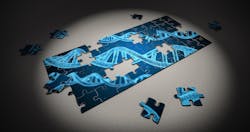In a study, researchers at Princess Margaret Cancer Centre describe a DNA modifying epigenetic therapy that can transform immune killer T-cells into "super soldiers," according to a press release from the center, which is part of University Health Network, a healthcare and medical research organization in Toronto, Ontario, Canada.
The findings could potentially enhance immunotherapy, a new paradigm in cancer treatment currently effective for a minority of cancer patients. Some patients respond well to immunotherapy, with their tumors drastically shrinking in size, but others respond only partially or not at all. Clinicians and scientists around the world are working to understand why immunotherapy only helps some patients.
The researchers first observed an increase in T-cell infiltration in mouse tumors treated with epigenetic therapy. When they removed the T-cells, the therapy stopped working, suggesting that the T-cells were contributing to the treatment success.
Intrigued by this finding, the researchers set out to apply this epigenetic DNA modifying therapy directly to T-cells in the laboratory. They isolated T-cells from healthy human donors, as well as from patients with melanoma, breast, ovarian and colorectal cancer. Their results proved that the epigenetic therapy enhanced the T-cells cancer killing ability.
Epigenetics works through addition or removal of chemical "tags" to DNA. Much like detachable post-it notes, these tags help to specify which genes can be turned on or off. Simply, you can change the function of a cell using drugs that change these epigenetic tags.
In essence, the researchers found that an available chemotherapy drug removed specific epigenetic tags that were keeping genes off in a subset of key genes in T-cells. Removing these tags turned these genes back on and acted to "turbocharge" the T-cells to become more effective killing machines.
The researchers discovered two specific genes that were activated by the epigenetic therapy and which were responsible for the T-cells to become better at killing the cancer cells.
High-dimensional, single-cell mass cytometry analyses – a next generation technology, which profiles single cells and drug response – revealed an increase in the numbers of granzyme and perforin proteins, which T-cells use to carry out their killing function. When unleashed, perforins are able to punch holes in a cell's membrane to allow granzymes to enter into an infected or cancerous cell to kill it.
Visit UHN for more news
